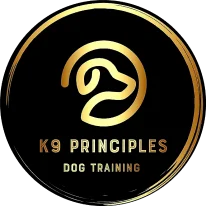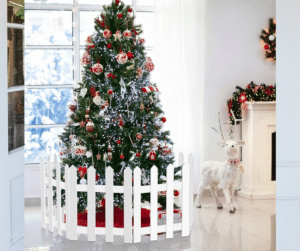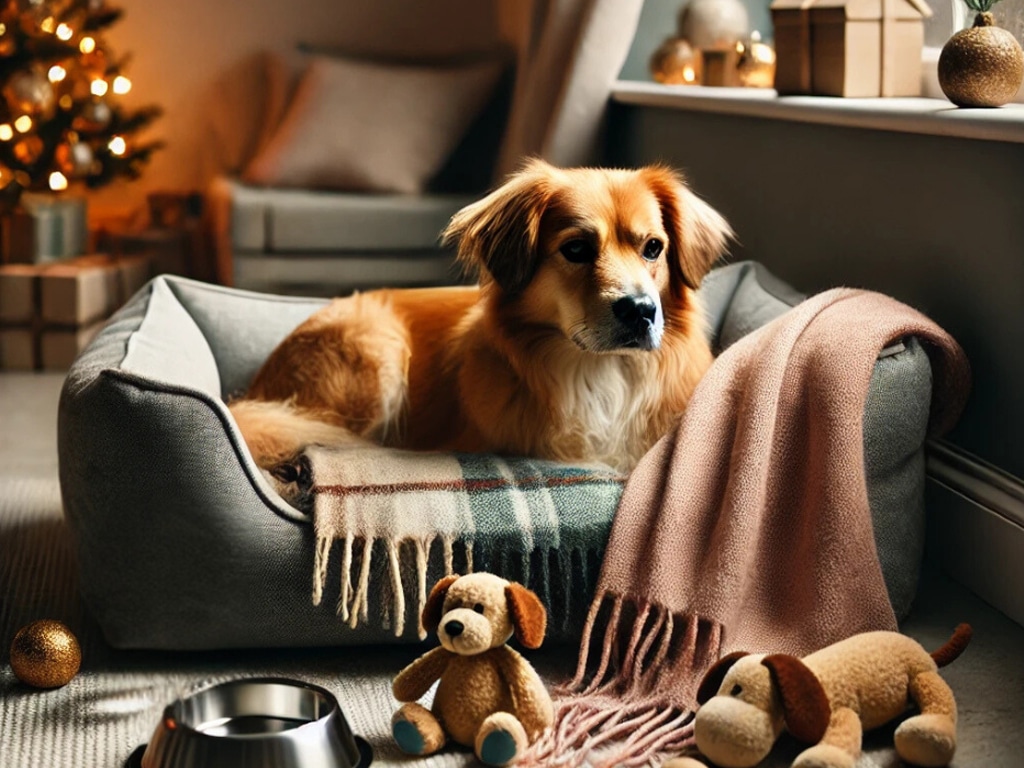How to Prepare Your Dog for the Festive Season
The festive season for is a time filled with joy, celebration, and cherished moments with loved ones. However, while humans delight in the hustle and bustle, dogs often find it overwhelming and even stressful. Loud noises, unfamiliar visitors, changes in routine, and tempting but dangerous holiday items can all create a challenging environment for your canine companion. If you are a first-time dog owner, you might be unsure how to help your dog stay calm and safe during this time. With a bit of preparation, you can ensure your dog enjoys the festive season as much as you do. This guide will provide you with all the information you need, including tips from professional dog training in Hamilton, to keep your dog happy and secure during the holidays.
Why the Festive Season Can Be Overwhelming for Dogs
Understanding why the festive season can be overwhelming for dogs is the first step to supporting them through it. Dogs are creatures of habit, and they thrive on consistency. Sudden changes in their environment or routine can be unsettling for them. The combination of loud noises, unfamiliar people, altered schedules, and tempting decorations can create a confusing and stressful environment for dogs. For puppies or dogs who have not been exposed to these stimuli before, the impact can be even greater. Recognising these challenges will allow you to take steps to minimise your dog’s stress and keep them safe.
Creating a Calm and Safe Space for Your Dog
Dogs need a designated area where they feel completely secure. During the festive season, this space becomes even more important as it provides them with a retreat from the noise and activity of the celebrations. A crate is an excellent option if your dog is crate-trained, as it replicates a den-like environment that many dogs find comforting. If your dog is not used to a crate, a quiet room such as a bedroom can work just as well.
Equip this space with your dog’s favourite bed, toys, and a bowl of fresh water. The goal is to make it as familiar and comforting as possible. It is essential that this area remains off-limits to guests or children, as your dog needs to know that they can rest undisturbed whenever they need to. This calm space acts as their safe haven throughout the festivities, helping them feel secure even when the environment around them is busy or loud.
Maintaining Your Dog’s Routine During the Holidays
Dogs rely heavily on routine to feel secure. Their schedules for feeding, walking, and playtime provide them with a sense of structure, and significant changes can cause confusion and anxiety. The festive season often brings a chaotic schedule for families, but maintaining your dog’s usual routine as much as possible is crucial for their well-being.
No matter how busy your holiday plans become, try to feed your dog at their usual times, take them on their regular walks, and dedicate time for play, training and interaction. By keeping these aspects of their life consistent, you can help them feel grounded and calm, even amidst the festive chaos.
Preparing Your Dog for Loud Noises
Loud noises such as fireworks, party music, and crackers are common during the festive season, but they can be terrifying for dogs. Noise sensitivity is a frequent issue in dogs, and sudden, unfamiliar sounds can trigger extreme fear or anxiety. To help your dog cope, desensitisation is a useful technique that can be started in advance of the festivities.
Play recordings of sounds like fireworks at a very low volume while giving your dog treats or praise to create a positive association. Gradually increase the volume over several sessions, ensuring your dog remains relaxed and comfortable. If your dog shows signs of stress, such as panting or pacing, lower the volume and proceed more slowly.
Despite your preparations, some dogs may still find loud noises distressing. Always have their calm space available and consider using white noise or calming music to help drown out external sounds. For particularly anxious dogs, speaking with a K9 Principles professional dog trainer can provide additional solutions and we could come out for an in-home private lesson to help get you started on the road to success all in the comforts of your own home at a time that works for you.
How to Introduce Your Dog to Guests
The holiday season often involves gatherings with friends and family, which means your dog may encounter unfamiliar faces. Meeting strangers can be overwhelming for dogs, particularly those who are not accustomed to socialising in a controlled manner. Puppies, in particular, require positive socialisation experiences, as forcing interactions can lead to long-term behavioural issues.
When introducing your dog to guests, let them approach at their own pace. Never force your dog to interact with visitors or allow guests to crowd them, as this can create fear or stress. If your dog seems nervous, give them the option to retreat to their safe space. Clear communication with your guests is vital; ask them not to overwhelm your dog and to allow interactions to happen naturally.
If you have a puppy, remember that quality matters more than quantity when it comes to socialisation. Focus on creating positive experiences rather than exposing them to as many people as possible.
Keeping Your Dog Safe During Busy Times
The festive season often means more people coming and going, with doors frequently opening and closing. This increases the risk of your dog slipping out unnoticed, which can lead to stressful situations for both you and your pet. While making sure your dog is wearing a secure collar with an ID tag is essential, and microchipping provides additional peace of mind, we also highly recommend putting a GPS on your dog such as Tractive as an added safety measure.
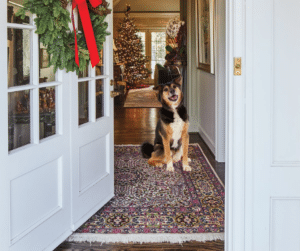
Training your dog to follow specific cues can make a significant difference in their safety during busy times. One key skill to teach your dog is door control. This involves training your dog to wait calmly at the door and not dash outside without your permission. Door control is a vital part of our level 1 dog training program, which focuses on building foundational skills for your dog’s safety and manners. By practising this skill, you can confidently open your door for guests, or deliveries knowing your dog will stay on the proper side of the door and you are not running all over the neighbourhood trying to corral them.
Another essential skill we teach in our level 1 program is the place cue, which teaches your dog to go to a designated spot, such as their bed or mat, and remain there until released. This is especially helpful during gatherings or busy moments, as it allows your dog to stay calm and out of harm’s way while still being part of the household activity. Teaching your dog to reliably follow the place cue not only keeps them safe but also helps reduce their anxiety during moments of high activity or noise.
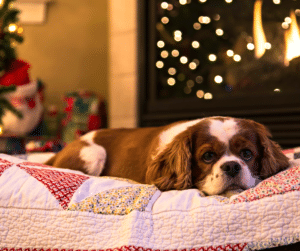
If you want to give your dog the tools they need to stay safe and well-behaved during busy times, consider enrolling in our level 1 program. This program is designed to build essential skills like door control and the place cue, ensuring your dog is prepared for everyday situations and festive chaos alike, making it a top choice for Hamilton dog training. Our in-home private training is a popular choice for busy adults as we come to your home at a time that works for you and we can get very fast results working one on one for concerns such as the place cue or door control.
Being proactive about your dog’s safety is one of the best ways to prevent accidents during the holiday season. Combining training with simple precautions, such as using baby gates or designating a quiet space for your dog, will provide the security and peace of mind you need to enjoy the holidays.
Avoiding Holiday Hazards
The festive season comes with an abundance of potential hazards for dogs, from toxic foods to dangerous decorations. Many popular holiday treats, such as chocolate, mince pies, and anything containing raisins, are highly toxic to dogs and must be kept well out of reach. Rich or fatty foods can also upset their stomachs, so it is best to stick to their regular diet.
Decorations such as tinsel, fairy lights, and small ornaments may seem harmless but can pose serious risks if ingested. Tinsel can cause internal blockages, while small ornaments can become choking hazards. Ensure decorations are placed out of your dog’s reach or use barriers to keep them safe. If your dog is particularly curious, consider using training to teach them boundaries around holiday items. We teach this skill in our level 1 program under the name of “Oops I dropped it”. They learn to not take anything, (ex. Food, pills, kids toys, counter surfing, etc.) without permission.
Providing Physical and Mental Stimulation
Exercise is a key component of a happy and balanced dog, and this remains true during the festive season. Regular walks and play sessions are not only essential for their physical health but also help burn off excess energy that can otherwise contribute to anxiety.
Mental stimulation is equally important, particularly if you are busier than usual. Puzzle toys, snuffle mats, and interactive feeders are excellent tools for keeping your dog engaged while you manage holiday preparations. A well-exercised and mentally stimulated dog is more likely to remain calm and relaxed, even during the busiest days.
Using Training Opportunities During the Festive Season
The holidays provide excellent opportunities to reinforce positive behaviours in your dog. For example, when guests arrive, you can teach your dog how to greet people politely. Keep treats by the door and reward your dog for calm behaviour, such as sitting or waiting quietly.
Encourage your guests to only interact with your dog when they are behaving appropriately. Consistent reinforcement of good manners will not only make your dog’s interactions more pleasant but also reduce stress for everyone involved.
Conclusion: Making the Festive Season Joyful for Your Dog
The festive season is a time to celebrate, but it can also be challenging for dogs who are unaccustomed to the changes it brings. By taking proactive steps to create a safe and calming environment, maintaining routines, and managing potential stressors, you can ensure your dog feels secure and happy throughout the holidays. A little preparation goes a long way in helping your dog navigate the festive season with confidence and ease. Training is key, and foundational dog training makes all the difference in creating a harmonious environment.”
Your efforts will not only make the holidays more enjoyable for your dog but will also strengthen the bond you share. After all, the festive season is about bringing joy to every member of the family, including your beloved dog.
- Name: K9 Principles
- Address: Haldimand County, Greater Hamilton Area, Burlington and Most of Norfolk County
- Phone: 289 880-3382
- Email: k9principlesinc@gmail.com
- Website: www.k9principles.ca
FAQs
-
A. Signs of stress in dogs include excessive panting, pacing, trembling, hiding, or refusing to eat. If you notice these behaviours, provide your dog with a calm and quiet space to relax.



